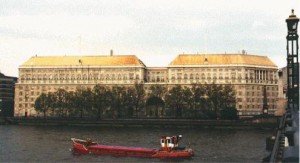Below is text of an article I wrote, published in The Sunday Telegraph a while ago about what it’s actually like to enter the wonderful world of spying (just in case it’s ever airbrushed out of history!):
“My so-called life as a spy”
Spies have always loved living in Pimlico: a civilised area in central London, handy for strolling to the office, and wonderfully convenient for that midnight dash to work if your operation suddenly goes live. Plus, the local pubs are pretty good for the customary after-work moan.
 I lived there myself when I worked as an intelligence officer for MI5 in the 1990s, so the murder of Gareth Williams in a nearby street gave me a bit of a jolt. While his death remains shrouded in mystery, what has been reported of his life sounds like classic GCHQ.
I lived there myself when I worked as an intelligence officer for MI5 in the 1990s, so the murder of Gareth Williams in a nearby street gave me a bit of a jolt. While his death remains shrouded in mystery, what has been reported of his life sounds like classic GCHQ.
There are distinct cultures within each of the three major UK spy agencies: MI5, the UK domestic security service; MI6, the overseas intelligence organisation; and GCHQ, the Government Communications HQ.
MI6 officers, as people who may have to work independently and undercover abroad, tend to be confident, individualistic and “ethically flexible”, while MI5 officers need to co-ordinate a broad range of resources and people to run an operation, which requires greater team-building. Of the three agencies, GCHQ remains the most secretive and inward-looking, and is staffed predominantly with “boffin” types. Williams, with his mathematical skills and loner tendencies, would be a typical employee.
Despite the intelligence community presenting a united front to the outside world, culture clashes between the three agencies are commonplace. Staff on secondment between agencies – as Williams was, from GCHQ to MI6 – can have a rough time fitting into a new environment, working with colleagues who eye them with suspicion, as the divisions jockey for power, prestige and resources within Whitehall.
So what is life like working as a spy? The world of intelligence is not so much isolating as insulating. Even as you proceed through the convoluted recruitment process, you find yourself entering a parallel universe, one that exists alongside your everyday life.
 From that first, exploratory meeting with an intelligence officer in an unmarked building in central London, you have to withdraw a little from your old existence. You are asked not to tell your family and friends, and immediately have to sign a notification of the rigorous terms of the Official Secrets Act, whereby if you talk about your work, you risk imprisonment.
From that first, exploratory meeting with an intelligence officer in an unmarked building in central London, you have to withdraw a little from your old existence. You are asked not to tell your family and friends, and immediately have to sign a notification of the rigorous terms of the Official Secrets Act, whereby if you talk about your work, you risk imprisonment.
The process of induction into this world is intriguing, flattering and seductive. The agencies tend to avoid the James Bond wannabes, and those inspired by the fake glamour of Spooks. The key motivation is generally wanting to do a job that can make a difference, protect the country and potentially save lives. The secret element adds spice and perhaps compensates for the anorexic pay. When I started working for MI5 in 1991, at the fast-track graduate level, the starting salary was £14,500 pa – a good £5,000 less than my peer group from Cambridge earned in their blue-chip jobs. The pay has improved somewhat since then, but you don’t become a spy for the money.
The vetting process is protracted. For MI5, MI6 and GCHQ, officers are required to have the highest clearance – Developed Vetting. This begins with a home visit. Disconcertingly, I soon found myself in the family sitting room being grilled about my sex life by a little, grey-haired lady who looked just like a favourite grandmother, until you looked into her eyes.
Then the process widens. I had to nominate four friends who were willing to be interviewed about me, and they were asked to suggest yet more people… so secrecy becomes impossible. One friend, of a Left-wing hue, disapproved of my recruitment; even those who were supportive were reluctant to ask me too much. As I couldn’t talk to them freely about my life, they felt increasingly shut out, so I lost old friends along the way.
 Unsurprisingly, new officers begin to socialise increasingly with their colleagues, and close friendships grow rapidly. Within this clique, we could talk shop at dinner parties, use the same slang and terminology, discuss our work, and whinge about our bosses. With outsiders, we could never be fully ourselves. This, inevitably, often led to more than friendships. What might otherwise be called office romances flourished. I met my former partner, David Shayler, when we were both in our first posting in MI5.
Unsurprisingly, new officers begin to socialise increasingly with their colleagues, and close friendships grow rapidly. Within this clique, we could talk shop at dinner parties, use the same slang and terminology, discuss our work, and whinge about our bosses. With outsiders, we could never be fully ourselves. This, inevitably, often led to more than friendships. What might otherwise be called office romances flourished. I met my former partner, David Shayler, when we were both in our first posting in MI5.
Such relationships were not exactly encouraged, but were generally seen as a good thing by management – unless, of course, it was a clandestine matter that could leave the officer vulnerable to blackmail. Such affairs were seen as vetting offences.
Among spies, an old double standard held firm. There was one couple who were caught in flagrante in the office, not once but twice. The male officer was put on “gardening leave” for six months; the woman was sacked.
For the first few weeks in the job, the feeling of unreality and dislocation is strong. The only solid information you have about your new position, as you walk into the office for the first time, is the grade at which you will be working – nothing else.
My first posting was to the small counter-subversion section, F2. Even though it was a desk job, the information I was dealing with came from sensitive sources: intercepted communications, reports from agents who had penetrated target groups, police reports. And yet, within a few weeks, the handling of such secret and intrusive information became entirely normal.
Investigations can be very fast-paced, particularly in the counter-terrorism sections. Generally, officers work regular hours but occasionally, if an operation goes live, you work around the clock. If it proves a success, there might be a news item on the television about it – but obviously without the full back story. That can be a surreal experience. You feel pride that you’ve achieved what you signed up to do, but you cannot discuss it with anybody outside the office. At such moments, the disconnect from mainstream life is intensely sharp.
 However, when something goes wrong – a bomb goes off in which civilians die – the feelings are even more intense. Guilt, anger, frustration, and a scramble to ensure that the blame doesn’t attach to your section. The official motto of MI5 is Regnum Defe
However, when something goes wrong – a bomb goes off in which civilians die – the feelings are even more intense. Guilt, anger, frustration, and a scramble to ensure that the blame doesn’t attach to your section. The official motto of MI5 is Regnum Defe
nde – defence of the realm. Staff mordantly used to joke that it should more accurately be Rectum Defende.
Personal security also ensures that there is a constant barrier between you and the normal world. If you meet someone interesting at a party, you cannot say too much about what you do, and such reticence can appear unfriendly. The cover story that MI5 officers use is that they work as civil servants at the Ministry of Defence; for MI6, it is the Foreign Office. This usually stops people from asking too much more, either through discretion or, frankly, boredom. Once or twice, people pushed me for more information, and my paranoia antennae immediately began to twitch: why are they so interested? Are they spies or, God forbid, journalists?
I had the misfortune once of using this cover story at a party, only to find my interlocutor actually worked for the real Ministry of Defence, and wanted to know which section I worked in, who my colleagues were, how long I had been there… Thankfully, the magic word “Box” – slang used to describe MI5 within Whitehall, derived from the organisation’s old PO Box 500 number – brought that line of conversation to an abrupt halt.
As an intelligence officer, you quickly learn to be discreet on the telephone and in emails. Oblique conversations become the norm, and this bleeds into your personal life, too, much to the frustration of friends and family.
The internet is another challenge. As a “spook”, the last thing you want to see is your photograph on a friend’s Facebook page. Or, even worse, holiday snaps showing you in your Speedos, as the current head of MI6, Sir John Sawyer, found to his cost last year.
And what about when you come to leave the intelligence service, as I did after five years. Can you ever really have a normal life afterwards, and shake off the mindset?
Many of my former colleagues have left and built careers in a wide variety of areas. But I wonder how many still look automatically over their shoulders as they put their key in the front door; how many tear up paper before throwing it in the bin; and how many are reflexively reticent about their personal life?
Would I want to be a spy these days? No, thank you. I’m happier in the real world.
* Annie Machon is the author of Spies, Lies and Whistleblowers (Book Guild)
 The quangocrats charged with overseeing the legality of the work of the UK spies have each produced their undoubtably authoritative reports for 2010.
The quangocrats charged with overseeing the legality of the work of the UK spies have each produced their undoubtably authoritative reports for 2010. 











